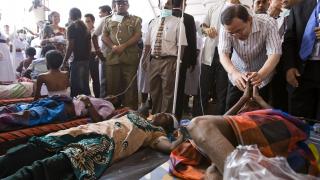
On 14 November, Secretary-General Ban Ki-moon made public an internal report into the UN's actions during the final stages of the Sri Lankan civil war and the aftermath.
The report, which was presented to him this morning, concluded that the UN system failed to meet its responsibilities in terms of its humanitarian and civilian protection mandates.
Mr Ban said that the report has "profound implications" for the UN's work across the world, and that he is "determined that the UN draws the appropriate lessons and does its utmost to earn the confidence of the world’s people, especially those caught in conflict who look to the Organization for help".
He announced that an immediate first step would be to organise a senior-level team to advise him on further actions.
In an interview with the BBC, Edward Mortimer, former UN Director of Communications and Chair of the Sri Lanka Campaign for Peace and Justice, said:
"There was a responsibility to protect in Sri Lanka but unfortunately it didn't get publicity like in Libya. The north of Sri Lanka was destroyed field by field, street by street, hospital by hospital but we didn't get that kind of reaction - Sri Lanka doesn't have much oil and isn't situated on the Mediterranean."
In the wake of the report, the Campaign is calling on the UN Secretary-General to take action by pushing for a credible, independent investigation into war crimes allegations. The call echoes a policy motion passed at UNA-UK's 2011 Policy Conference.
Mr Ban's statement is available here and reproduced in full below.
(Photo: Ban meeting wounded Sri Lankans in a displacement camp in 2009, UN Photo/Eskinder Debebe)
New York, 14 November 2012 - Statement of the Secretary-General on Internal Review Panel Report on Sri Lanka
The conduct of the final months of the war in Sri Lanka in 2009 generated profound concerns about alleged violations of international human rights and humanitarian law. In 2010, following an agreement with President Mahinda Rajapaksa, I established a Panel of Experts to advise me on measures to advance accountability.
The Panel of Experts report raised a number of significant issues, including those regarding the United Nations response to the terrible situation facing civilians in the north of Sri Lanka. The Panel recommended “a comprehensive review of action by the United Nations system during the war in Sri Lanka and the aftermath, regarding the implementation of its humanitarian and protection mandates.”
I, therefore, established a new Panel to do just that. The Panel, headed by Mr. Charles Petrie, has now completed its 8-month study. This morning Mr. Petrie briefed me on the report’s findings and recommendations.
The report concludes that the United Nations system failed to meet its responsibilities -- highlighting, in particular, the roles played by the Secretariat, the agencies and programmes of the UN Country Team, and the members of the Security Council and Human Rights Council.
This finding has profound implications for our work across the world, and I am determined that the United Nations draws the appropriate lessons and does its utmost to earn the confidence of the world’s people, especially those caught in conflict who look to the Organization for help.
The Panel’s report recognizes initiatives we have taken in the wake of the events in Sri Lanka to prevent a similar breakdown. However, I am fully committed to ensuring that we do much more.
As an immediate first step, I will organize a senior-level team to give careful consideration to the recommendations and advise me on a way forward. Other action will follow in short order.
As transparency and accountability are critical to the legitimacy and credibility of the United Nations, I also decided some days ago to make the report public.
From the beginning of my tenure as Secretary-General, I have been committed to strengthening the United Nations and its core mission of protecting people from harm. Events today in Syria are the latest reminder of just how crucial that work is.
Our obligation to all humanity is to overcome our setbacks, learn from our mistakes, strengthen our responses, and act meaningfully and effectively for the future. These principles and objectives drove me to establish the Panel and they will guide us as we take forward its outcomes.






